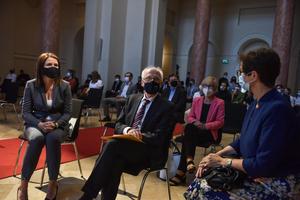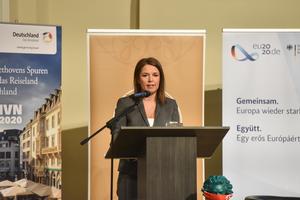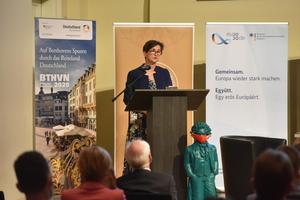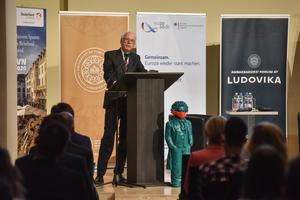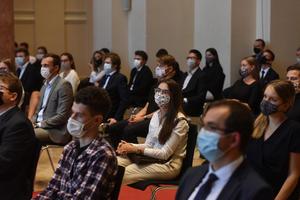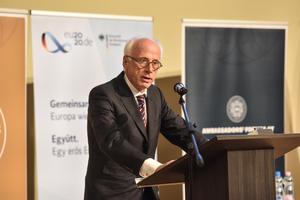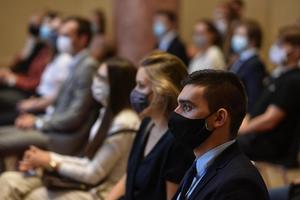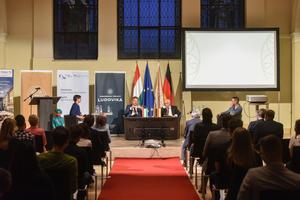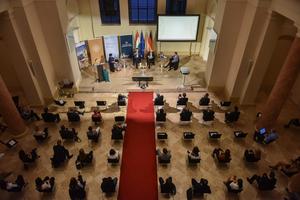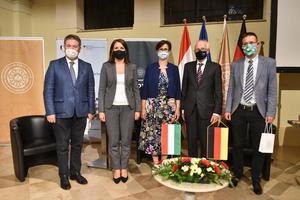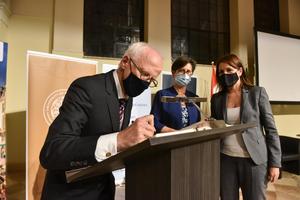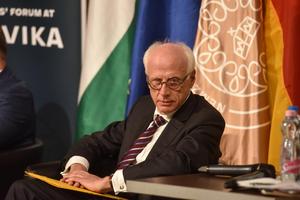The German Ambassador to Budapest, Johannes J. Haindl, also representing the Presidency of the Council of the European Union since July, was the guest of the first Ambassadors' Forum at Ludovika – University of Public Service this academic year. The recently appointed diplomat spoke, besides the EU presidency's plans, about German-Hungarian relations, the fight against the coronavirus as well as the plan to strengthen Europe.
“Germany is not only a strong member of the European Union, but also a valued partner of Hungary. A friend." - Klára Breuer greeted the guests in the Chapel of Ludovika. The International Director of Ludovika - University of Public Service thanked the German Ambassador for accepting the invitation despite the virus situation and asked him to give his opinion on the possibility of joint European action, deepening the ties between the Member States. Klára Breuer said: "If we are at a crucial point in the history of the European Union, the opportunity for common action, European solidarity and common values will be necessary tools."
"The Ambassadors' Forum at Ludovika is a unique, special series of programs of the university, which provides an opportunity to discuss current political, economic and social issues," Boglárka Koller greeted the participants of the forum. The Vice-Rector for international affairs said that the audience could receive first-hand information about the program of the German presidency, the goals of the Council of the European Union as well as the present and the future of the European Union. The evolution of Germany's domestic policy is at least as important as the examination of its foreign policy actions and actions at EU level. "This is a game that is played at the same time at the level of domestic politics and the European Union," Boglárka Koller emphasized.
The Ambassador recalled the experience of previous German Presidencies and touched upon the development of the history of the European Union. "The EU has been in crisis mode for years: the fight began ten years ago with the financial crisis, the migration and immigration crisis has continued, and now the challenges posed by COVID-19 have to be managed," said Johannes J. Haindl, who emphasized: The aim is for the EU to emerge stronger from the crisis. He then set out the main objectives of the German presidency's program to strengthen the European Union. While tackling the long-term consequences of the corona virus crisis is a priority, it must be done for economic and social recovery, for a stronger and more innovative Europe, which will be able to achieve the principles of fairness, sustainability, security and a consensus of common values. The German Presidency of the Council of the European Union is therefore focusing on combating the COVID-19 pandemic: curbing the spread of the virus, supporting the recovery of the European economy and strengthening Europe's social cohesion, all under the arch of European solidarity and common interests. “Initially, the goal was to build a better future, and today the European Union has become a global player ready to face any challenge. The goal is not mere to build a peaceful world, and that requires new narratives,” said Johannes Haindl. The German ambassador also addressed a number of other issues shaping the future of the Union: the need to combat climate change; the stronger promotion of gender equality; the challenges of digital and economic transformation, but also how he envisages the current migration regime. It also means policy review and the designation of new directions.
In the panel discussion following the lectures, Gergely Prőhle, former Hungarian Ambassador to Berlin, Director of the Institute for Strategic Studies, spoke about the development of German-Hungarian relations and the fact that emotional considerations play an important role in developing relations between the two states. The third participant of the conversation, András Hettyey, drew attention to the history of German-Hungarian relations and to the critical view of history. The associate professor also spoke about the importance of German-Hungarian economic relations and about the future of Central Europe.
“My aim is to draw the attention of both parties to our common interests, because we often have more in common than what is apparent from the outside,” Ambassador Johannes J. Haindl concluded the evening with these thoughts.
